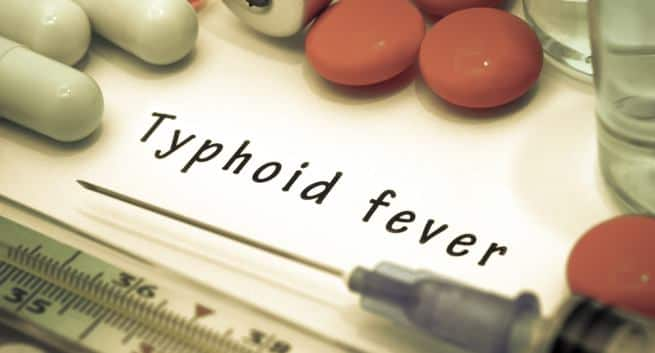|
|
Typhoid: Causes, Symptoms, And Treatments
Money Land Forum / Health / Typhoid: Causes, Symptoms, And Treatments (1 Post | 154 Views)
(1) (Go Down)
|
Typhoid: Causes, Symptoms, And Treatments by atoluwash(m) : 7:47 am On Nov 06, 2017 |
|
Typhoid fever, also known only as typhoid, is a bacterial disease because of Salmonella typhi which leads to symptoms. Symptoms may differ from mild to severe and generally begin six to thirty days following exposure. Frequently there's a slow onset of a top fever over a few days. Diarrhea is rare and vomiting isn't usually severe. Some people today create a skin rash using increased colored spots. In severe cases there might be confusion. Without treatment symptoms can last months or weeks. Other people can take the bacterium without being affected; nevertheless, they continue to be able to spread the disease to other people. Typhoid fever is a sort of enteric fever together with paratyphoid fever.
 The cause is the bacterium Salmonella typhi, also called Salmonella enterica serotype Typhi, growing from the intestines and blood. Typhoid is spread by eating or drinking food or water contaminated with the feces of an infected person. Risk factors include poor sanitation and inadequate hygiene. People who journey to the developing world will also be in danger and only individuals can be infected. Diagnosis is by either culturing the bacteria or discovering the bacterium's DNA from the blood, feces, or bone marrow. Culturing the bacterium can be hard. Bone marrow testing is the most authentic. Symptoms are like that of several other infectious diseases. Typhus is not the same disease. A typhoid vaccine can stop about 30 percent to 70 percent of instances during the first two years. The vaccine might have some effect for up to seven years. It's suggested for people at high risk or individuals traveling to areas in which the disease is normal. Other attempts to avoid the disease include supplying clean drinking water, better sanitation, and much better handwashing. Until it's been verified that an individual's disease has been cleared, the person shouldn't prepare food for others. Treatment of disease is with antibiotics such as azithromycin, fluoroquinolones or third generation cephalosporins. Resistance to these antibiotics has been growing, which has made remedy of this disease more challenging. Symptoms of typhoid Symptoms normally begin 6-30 days following exposure to the germs. Typhoid fever is very high, slowly increasing over a few days as much as 104 degrees Fahrenheit. The rash, that doesn't affect every individual, is made up of rose-colored stains, especially on the throat and abdomen. Other symptoms may include fatigue, stomach pain, constipation, and headaches; infrequently, symptoms may include confusion, vomiting , and diarrhea (although not generally acute). In severe, untreated cases, the bowel can get perforated; this may result in peritonitis (a disease of the tissue which lines the interior of the abdomen), which is quite serious really.5 Notice: paratyphoid has similar symptoms to typhoid but is brought on by Salmonella enterica. The two conditions are of comparable severity. Typhoid cause The bacterium that causes typhoid fever might be spread through poor hygiene habits and people sanitation requirements, and at times also by flying insects feeding on stool. Public education campaigns encouraging people to wash their hands after defecating and before handling food are still an essential element in controlling spread of their illness. According to data in the United States Centers for Disease Control and Prevention (CDC), the chlorination of drinking water has Resulted in dramatic reductions in the transmission of typhoid fever in the USA. Bacteria The cause is the bacterium Salmonella Typhi, also known as Salmonella enterica serotype Typhi. There are two main types of Typhi namely the ST1 and ST2 based on MLST subtyping scheme, which are currently widespread globally. Prevention of typhoid Sanitation and hygiene are important to reduce typhoid. Typhoid doesn't affect animals aside from humans. Typhoid can simply spread in environments where human feces have the ability to come in contact with food or drinking water. Careful food preparation and washing of hands are critical to reduce typhoid. Industrialization, and specifically, the creation of the car, contributed heavily to the removal of typhoid fever, as it removed the public health dangers associated with having horse manure from the public road which resulted in substantial number of flies. Vaccination Two typhoid vaccines are approved to be used for preventing typhoid: the live, oral Ty21a vaccine (marketed as Vivotif by Crucell Switzerland AG) and the injectable typhoid polysaccharide vaccine (marketed as Typhim Vi by Sanofi Pasteur and 'Typherix by GlaxoSmithKline). Both are efficacious and advocated for travelers to areas where typhoid is endemic. Boosters are recommended every five years to the oral drug and each 2 years to its injectable form. An elderly, killed-whole-cell vaccine is still utilised in states where the newer preparations aren't accessible, but this vaccine is no longer suggested for use as it's a high rate of side effects (mostly swelling and pain at the website of the injection). Before traveling to a high-risk area, getting vaccinated against typhoid fever is recommended. This can be achieved by oral medication or a one-off injection: Oral - live, attenuated vaccine. Consists of 4 tablets - one taken every other day, the last of which is taken 1 week before travel. Shot - inactivated vaccine, administered 2 weeks before travel. Note: vaccines are not 100 percent effective and caution should still be exercised when eating and drinking. Anyone with HIV should not take the live, oral dose. There may be side effects to the vaccine: Shot: fever (1 in 100 cases) Shot: headache(1 in 30 cases) Shot: redness or swelling at the site of injection (1 in 15 cases) Oral: fever or headache (1 in 20 cases) Oral: stomach pain, nausea, vomiting, rash (rare) Even if the signs of typhoid have passed, it's still possible to be carrying the germs. Consequently, it's hard to completely stamp out the disease as carriers whose signs have ended may quit displaying caution when washing food or interacting with other individuals. Even though there are two varieties of typhoid drug available, a more potent vaccine is still required. The dwell, oral version of the vaccine is the most powerful of both; following 3years, it still protects people from disease 73 per cent of the moment. The current vaccines aren't always successful, and since typhoid is indeed prevalent in poorer states, more study has to be done in order to find better methods of preventing its spread. Irrespective of efficiency, treating kids in risky regions with current vaccines are of advantage. Regrettably, due to the comparatively higher price, authorities are unwilling to embrace them. Treatment of typhoid The only effective treatment for typhoid is antibiotics. The most commonly used are ciprofloxacin (for non-pregnant adults) and ceftriaxone. Other than antibiotics, it is sensible to rehydrate by drinking adequate water. In more severe cases, where the bowel has become perforated, surgery may be required. Typhoid antibiotic resistance Much like lots of other bacterial diseases, the issue of antibiotic resistance is impacting the selection of medication available to typhoid sufferers. In the last several years, typhoid is now immune to trimethoprim-sulfamethoxazole and ampicillin. Ciprofloxacin, among the crucial drugs for typhoid, can be suffering a similar fate. A number of studies have discovered Salmonella typhimurium immunity rates to be approximately 35 percent. Source: https://aderonkebamidele.com/typhoid-causes-symptoms-treatments/ |
(1) (Reply)
Fragile X Syndrome Causes, Signs And Symptoms / Dizziness: Causes, Symptoms, And Treatment / Jopan approves Modern, AstraZenca Vaccines /
(Go Up)
| Money Land Forum - Copyright © 2016 - 2024 | Aderonke Bamidele (Admin). All rights reserved. Follow Money Land Forum on Facebook and Twitter Disclaimer: Every Money Land Forum member is solely responsible for anything that he/she posts or uploads on Money Land Forum. |

